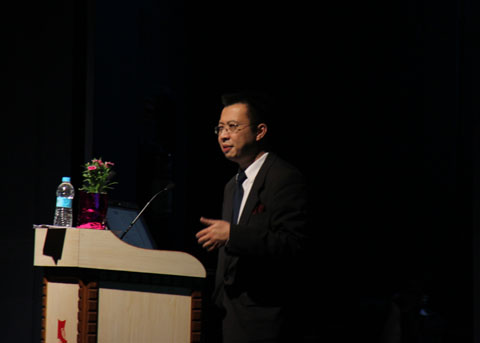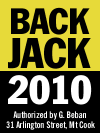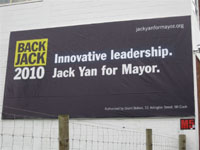 Baidu Talk, which launched in September, has netted 1 million users already, according to PC World. Michael Kan reports that thanks to the service’s insistence that no aliases are used (registered users’ identities are verified with the People’s Republic’s government) ‘this has led to more “civil” discussions between users on Baidu Talk.’
Baidu Talk, which launched in September, has netted 1 million users already, according to PC World. Michael Kan reports that thanks to the service’s insistence that no aliases are used (registered users’ identities are verified with the People’s Republic’s government) ‘this has led to more “civil” discussions between users on Baidu Talk.’
It shows it can be possible. In the past I’ve lamented the decline of each medium as it’s spoiled by spam or splogs. YouTube has been ruined by extremist commenters. In most cases, these people hide behind the veil of anonymity.
The city blog I proposed during my campaign would have required registration as well. The logistics were another matter but Baidu shows it can be done—and a more civilized discussion is just what we need to make some real progress in society. If dialogue and engagement solve problems, then the medium for both must be where someone wants to go—and not see a whole bunch of swearing going on.
As I wrote some years back, what I miss about the internet, and this may be rose-coloured glasses, was the collegial feeling that was there in the early days. In the 1990s, we naïvely put our details into online email directories before we figured out that spammers could harvest them. But, importantly, we got quite a few things done. Some of my closest allies in business can be traced back to those early days, before we had to cut through more clutter to find good, trustworthy people.
Providing a safe forum where the veil of anonymity is gone—where John Gabriel’s Greater Internet F***wad Theory does not apply—is perhaps one of the best things that can be done for so many services. A Small World is one where there’s some degree of safety and security; LinkedIn, by its nature, continues to feel collegial. Since we aren’t talking about sensitive information here, where aliases and anonymity might be key, an online John Hancock can be a good thing.
The bigger picture is that if China is encouraging this sort of dialogue, I will have to say: watch out. And I did say four years ago that, with Google’s willingness to engage in self-censorship when it entered the Middle Kingdom in 2006, the Chinese people would only be more loyal to Baidu et al in the long term. That influence might yet grow beyond China’s borders.
Speaking of the decline of society, a few weeks ago, Dad and I had to go to the ANZ in Kilbirnie to re-sign some authorities we had on each other’s accounts. (We had to do this with American Express as well: what was it with these big institutions losing the original authorities that we did years ago, all in the same week?) Outside the sliding doors, I heard a very loud female voice. My initial thought was, ‘This is a very loud promotion someone is having on Bay Road.’
When the doors slid open again, I heard a whole bunch of profanities. ‘You f***ing bitch, you whore …’—you get the idea. I got up, passed an elderly lady on her way in (this was Tuesday, 3.30 p.m., when a lot of elderly are walking along Bay Road), and said, ‘You don’t need to hear that sort of language, do you, dear?’ She said, ‘No.’
A crowd, mostly of schoolchildren had gathered round to watch these two young women at it outside the local Pricebusters. Or, should I say, there was one abuser and one standing there and taking it. Seeing as neither was armed (I may be stupid, but not that stupid), I stood between them and asked them to stop: that the OAPs walking along minding their own business don’t have to listen to their sort of language.
‘I don’t care. You don’t know this f***ing whore …’
‘I don’t know you, either. I’m asking you to stop.’
Although this had gone on for some time, it was only then that someone from the Pricebusters store came out. I asked, ‘Would you like to do anything? It’s your shop, but there hasn’t been an assault.’
Seeing as the abuse continued, I said, calmly: ‘Walk away. Turn around, walk in opposite directions, and walk away.’
I have a feeling that ‘Walk away’ in these ladies’ mother tongue meant ‘Let’s start beating the crap out of each other and this dude in the middle can get caught in the crossfire.’
Fists flew, hair was pulled, and I got a little scrape where my watch was and my glasses were knocked off. It was then that various adults—I assume the female staff of the Pricebusters store—restrained the two. I advised the store that they could call the police now. Dad had come out by then and I suggested we finish the transaction inside the bank. And he didn’t need to see his son lose a fight to two women.
These Streets of San Kilbirnie are tough and even Karl Malden would be surprised.
Maybe I was the only adult around over several minutes, but I’m surprised that no one else helped out. It reminds me of two other incidents in the last few years where I played “first responder” (with a much larger friend assisting!) to a homeless man getting bullied and to a teen who had fallen off her bike.
This isn’t about being intolerant of bad language. Most of this junk is on telly now after a certain hour. It’s the idea, which we’ve chatted about at the Vista Group luncheons with Jim and Natalie, that once we tolerate one thing, a worse thing will emerge. Usually this comes up when we discuss public drunkenness, and how, over the last generation, less and less acceptable behaviour becomes the norm.
The fear that getting involved would drag one into a court case as a witness—that is baseless, too. When the police came (and quite quickly, too), I had finished at the bank. I asked one constable if he needed me to be a witness, and he said that he already had a statement from someone else. So: I tried to do a good deed, and I didn’t get dragged into a prolonged assault case. It’s easier than we think.
And maybe I did something for the little guy, to draw the line at something that shouldn’t be acceptable in what is usually a very pleasant neighbourhood.





I have been thinking about this post for several days, Jack. It reminds me of inter-blog discussions I’ve had on manners and civility.
Much of modern society seems to be in an imbalance about it– not just the Internet. There is either too much guilt and shame, or very little at all. I refute those that say guilt and shame is inherently bad: when properly used, and in the correct amount, it simply reminds citizens of their society’s rules, and where the boundaries are.
As to the issue of perceived anonymity, and real-name rules: Some of my contacts have been quite worried as I have used my real name (first, middle initial, last) in my e-mails. But it is only my username, “jaklumen” that is truly unique. There are others with my first and last name, and perhaps a few that share my middle name, either by initial, or in full.
But all the research I have done says again and again that “jaklumen” is me, and only me. My alias is unique, and my electronic trail is NOT obscure. Granted, I am a little less forthcoming about my location, or the identities of my family.
As to your situation: I have seen that attitudes change somewhat according to the locale. New York City is already famous for “just don’t get involved”, and I would expect many other large metro urban areas are this way, too. But I suspect the vast majority of people in most communities would find their experience to be similar to yours.